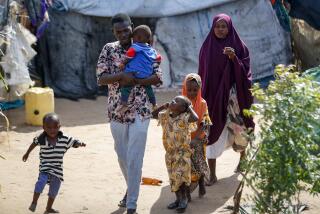‘Behind Lines in Mozambique’
- Share via
Behn praises Renamo’s “miles of flourishing corn, manioc, beans and rice farms.” She fails to explain that the Mozambican government forces, in their campaign to wipe out the Renamo bandits, do not destroy crops. Such rampant destruction and pillage is the policy of Renamo, the “contras” of Mozambique. Behn should have visited some of the empty fields, where peasant food crops are systematically destroyed by Renamo.
She could have taken a broader look, spent time with my Oxfam America colleagues in neighboring Zimbabwe, visiting some of the 30,000 Mozambican displaced persons still in refugee camps. At the height of the drought in 1984, 100,000 Mozambicans died of starvation, as Renamo attacked relief convoys of the U.N. World Food Program.
Another 100,000 (mostly women and children) were able to straggle across the border to Zimbabwe, fleeing both drought and Renamo. Behn should look at pictures of these victims, weak from months of meager ration, walking up to a week without food; some did not make it.
Since then, an additional 200,000 have fled to Zambia, Malawi and even South Africa to escape the war perpetrated by the South African apartheid regime, through its surrogate Renamo. Within the country itself, one-fourth of the population is uprooted. Infant mortality is the highest in the world.
The people of Zimbabwe, with international assistance from UNICEF, the U.N. High Commissioner for Refugees, and private voluntary agencies such as Oxfam America and Save the Children Fund, have provided housing, schools and health clinics for the past three years. Bonds are cemented in a new people-to-people channel, the Zimbabwe Mozambique Friendship Assn. Behn mentions only the military support to Mozambique, ignoring these deeper ties.
In the camps, Mozambicans have improved their skills in agriculture as they grow much of their own food, especially vegetables to supplement the basic diet. Many have learned new sewing skills, improved their reading ability and experienced community organization as the povo organizado .
They are eager to return home. Although the drought has receded from most of the country, they cannot return, because of the continuing terrorist tactics of Renamo, fully supplied by the South African apartheid regime.
Ironically, Renamo makes its appeal for external food relief in its own camps. The international community would do well to expose Renamo’s senseless attacks on food convoys and call for a complete cessation of apartheid aggression, a necessary first step toward peace and prosperity in Mozambique. Then, the refugees could return home.
WARREN J. DAY
Los Angeles
Day was an Oxfam America representative in Zimbabwe from 1984 to 1986.
More to Read
Sign up for Essential California
The most important California stories and recommendations in your inbox every morning.
You may occasionally receive promotional content from the Los Angeles Times.













